Wilton St, Denton
This firm of felt and fur hat manufacturers was founded by Edgar Wilde and James Booth. It is known to have been in business in 1878 and it was recorded in Wilton St in 1882.
It occupied two sites on the south side of Wilton St. One was the 'Top End' Works, which was located between Queen St and Prestwich St (formerly Dudley St), and the other was the 'Bottom End' Works, which was near the junction with Taylor Ln.
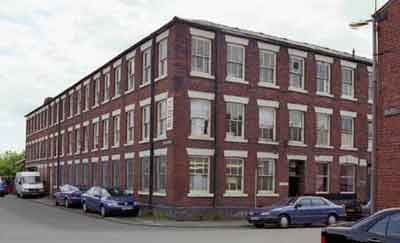
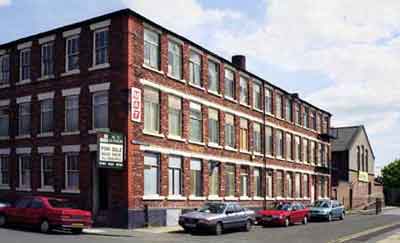
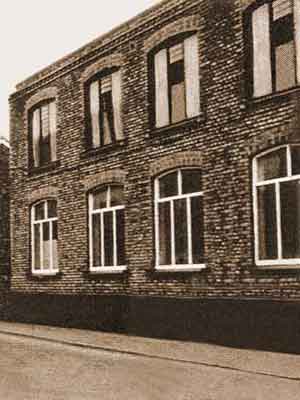
Top left: The 'Top End' Works viewed looking along Queen St from the Marshall St corner of Wilton St, May 1999.
Top right: The 'Top End' Works viewed looking along Prestwich St from Wilton St, May 1999.
Left: The 'Bottom End' Works on Wilton St.
On the 30 Mar 1933 Wilde & Booth Ltd was voluntarily wound up. The directors were Arnold Edgar Wilde (also company chairman) of Wilton St and James Ashton Booth of Denton Rd, Audenshaw. Both directors were appointed as liquidators. On the 7 Sep 1948 the company was struck off the Register of Companies.
Edgar Wilde was born at Denton in 1856 and he died at Buxton on the 16 Mar 1909, aged 53 years. His son, Arnold Edgar Wilde, was born at Denton in 1886 and he died at Thornton-le-Fylde on the 26 Jun 1947, aged 61 years. Edgar Wilde’s business partner, James Booth, was born at Haughton in 1853 and his son, James Ashton Booth was born at Audenshaw in 1889. In 1911 James Booth (58) was resident on Denton Rd, Hooley Hill, Audenshaw, with his wife, Alice (57), daughter, Ada Alice (25) and son, James Ashton (21).
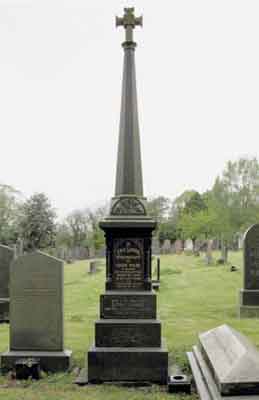
Denton Cemetery, May 2009.
World War Two, Air Raid Precautions (ARP)
Prior to the outbreak of the Second World War part of the ‘Top End’ Works was requisitioned as the Denton Central Air Raid Precautions (ARP) Report Centre.
However, in 1941 the name of these centres was changed to ‘Civil Defence Control Centre’ when the ARP became the Civil Defence Service.
From the 1 Sep 1939, ARP wardens enforced the ‘blackout’. Heavy curtains and/or shutters were required in all residences, commercial premises and factories to prevent light escaping and so making them a possible marker for enemy bombers to locate their targets.
The ARP silver badges were awarded at the end of training. They were made by the Royal Mint and the initials ‘J·C’ on the Hallmark are for John Herbert McCutcheon who was the Deputy Master and Comptroller of the Royal Mint from 1938. Date letters from 1938 (C) to 1942 (G) have been recorded.
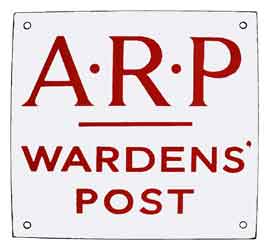
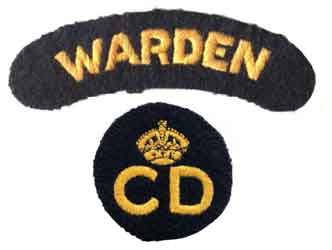
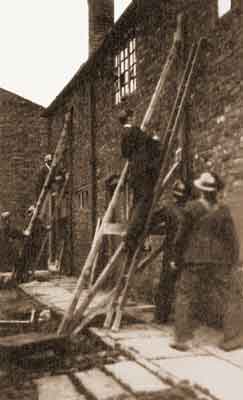 The ARP practising at the hamlet of Beat Bank, Denton, in 1940.
The ARP practising at the hamlet of Beat Bank, Denton, in 1940.Part of the ‘Top End’ Works of Wilde & Booth Ltd on Wilton St was used as the Denton Central Air Raid Precautions (ARP) Report Centre but in 1941 the name was changed to the ‘Civil Defence Service’. The Deputy Town Clerk of Denton, Fred Hamer, was in charge of the ARP Report Centre. The ARP had an equipment store in Denton Council’s Board Yard off Victoria St. This included, torches, stretchers, ladders, ropes, timber props, lifting equipment and vehicles. The yard was shared with the Auxiliary Fire Service (AFS) and St John Ambulance.
A mock bombed house was built in the yard that contained ‘injured’ dummies. Here, rescue parties practiced removing these dummies to safety. Similarly, a disused house on Two Trees Ln and another at Beat Bank, off Stockport Rd, were used for practice purposes.
Men and women could also joint the Home Guard, previously the Local Defence Volunteers (LDV), and the Women’s Land Army, respectively. Men between the ages of 17 and 65 years were eligible to join the Home Guard and on acceptance they were subject to military discipline.
Closure
In 1952 Tacon Bros Ltd moved into the ‘Top End’ Works from Manchester.
This company manufactured office requisites and the founders of this business were the brothers Frank and William Harold Tacon. The works was then renamed Canto House. This business closed in c.1972.
Both the ‘Top End’ and ‘Bottom End’ works were demolished in 2003 to make way for the Crown Point North Shopping Park.